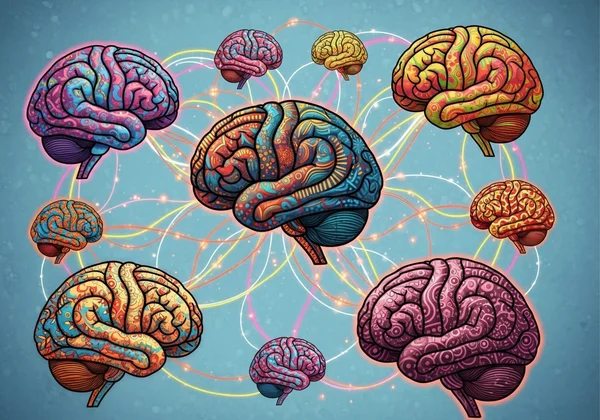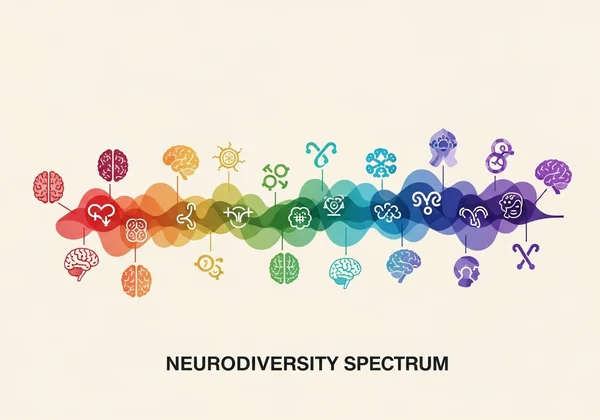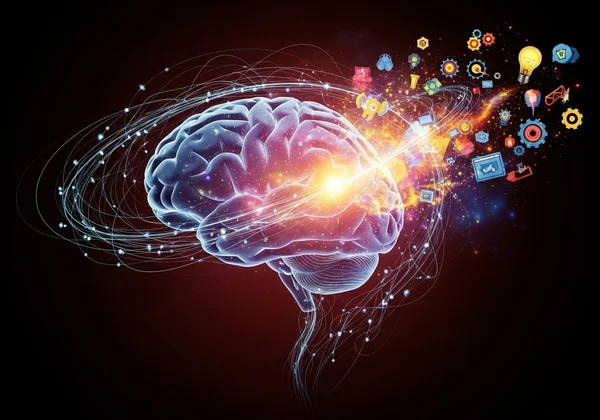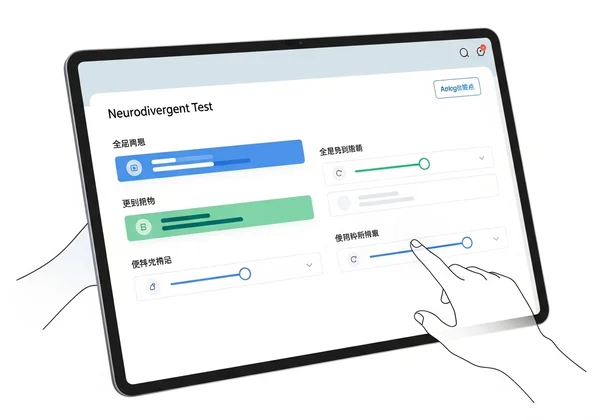เจาะลึกความหลากหลายทางระบบประสาท: สำรวจประเภทที่นอกเหนือไปจาก ADHD และออทิสติก
July 13, 2025 | By Morgan Hayes
คุณเคยรู้สึกว่าสมองของคุณประมวลผลข้อมูลแตกต่างจากคนอื่นเล็กน้อยหรือไม่? บางทีคุณอาจเคยสงสัยว่า ฉันมีความผิดปกติทางระบบประสาท หรือแค่เป็นคนแปลกๆ/ขี้เกียจ/ขี้กังวลกันแน่? คุณไม่ได้เดียวดายในความสงสัยนั้น แม้ว่าคำศัพท์ต่างๆ เช่น ADHD และออทิสติกจะได้รับการยอมรับอย่างกว้างขวางมากขึ้น แต่ภูมิทัศน์ของความหลากหลายทางระบบประสาทมีความสมบูรณ์และหลากหลายมากกว่าที่หลายคนตระหนัก การทำความเข้าใจโปรไฟล์ทางระบบประสาทที่เป็นเอกลักษณ์เหล่านี้สามารถเป็นก้าวสำคัญสู่การยอมรับตนเองและชีวิตที่สมบูรณ์ยิ่งขึ้น
พร้อมที่จะสำรวจโลกอันน่าทึ่งของประเภทของระบบประสาทที่หลากหลายแล้วหรือยัง? บทความนี้จะก้าวข้ามการพูดคุยทั่วไปเกี่ยวกับ ADHD และออทิสติก เพื่อเปิดเผยความแตกต่างที่สำคัญอื่นๆ ซึ่งนำเสนอความเข้าใจที่ลึกซึ้งยิ่งขึ้นว่าสมองของเราทำงานอย่างไรอย่างเป็นเอกลักษณ์ เราจะพิจารณาว่าการเป็นคนที่มีความผิดปกติทางระบบประสาทหมายถึงอะไร ทำไมความเข้าใจนี้จึงมีความสำคัญ และเน้นประเภทของระบบประสาทที่เฉพาะเจาะจงที่คุณอาจไม่คุ้นเคย หากคุณพร้อมที่จะเริ่มต้นการเดินทางแห่งการค้นพบของตนเอง แบบทดสอบออนไลน์ฟรีเกี่ยวกับภาวะความผิดปกติทางระบบประสาท ของเรา จะเป็นจุดเริ่มต้นที่มีคุณค่าในการทำความเข้าใจลักษณะเฉพาะของคุณ

ความผิดปกติทางระบบประสาทคืออะไร? ทำความเข้าใจภาพรวมที่กว้างขึ้น
ความผิดปกติทางระบบประสาท (Neurodivergence) เป็นคำที่กว้าง ครอบคลุมความผันแปรตามธรรมชาติของสมองมนุษย์ที่เกี่ยวข้องกับสังคม การเรียนรู้ สมาธิ อารมณ์ และการทำงานของจิตใจอื่นๆ เป็นแนวคิดที่ครอบคลุมซึ่งยอมรับว่าไม่มีวิธีใดวิธีหนึ่งที่ "ถูกต้อง" สำหรับสมองในการทำงาน แต่เป็นการเฉลิมฉลองความหลากหลายของจิตใจมนุษย์ แบบทดสอบความหลากหลายทางระบบประสาท สามารถเป็นขั้นตอนแรกในการเดินทางแห่งการค้นพบตนเอง ช่วยให้บุคคลระบุลักษณะที่อาจเกิดขึ้น ลองนึกภาพว่าเป็น สเปกตรัมความหลากหลายทางระบบประสาท (neurodiversity spectrum) ที่ซึ่งความแตกต่างไม่ถูกมองว่าเป็นข้อบกพร่อง แต่เป็นการผันแปรตามธรรมชาติ
สุขภาพจิตปกติเทียบกับความผิดปกติทางระบบประสาท: ความแตกต่างพื้นฐาน
ในการทำความเข้าใจภาวะความผิดปกติทางระบบประสาท สิ่งสำคัญคือต้องชี้แจงคำว่า ผู้มีระบบประสาทแบบปกติ (neurotypical) ก่อน บุคคลที่มีระบบประสาทแบบปกติ คือบุคคลที่สมองทำงาน ประมวลผล และเรียนรู้ในลักษณะที่โดยทั่วไปถือว่าเป็นมาตรฐานหรือปกติสำหรับประชากรส่วนใหญ่ นี่ไม่ได้หมายความว่า "ดีกว่า" หรือ "แย่กว่า" เพียงแต่แตกต่างกัน ในทางตรงกันข้าม บุคคลที่มีความผิดปกติทางระบบประสาทมีสมองที่ทำงานในลักษณะที่แตกต่างไปจากมาตรฐานปกติเหล่านี้ ความแตกต่างที่สำคัญนี้ช่วยให้เราชื่นชมความหลากหลายอันน่าทึ่งในวิธีที่ผู้คนมีประสบการณ์กับโลกและประมวลผลข้อมูล หากคุณกำลังสงสัยว่าคุณอาจอยู่ในกลุ่มไหน แบบทดสอบความหลากหลายทางระบบประสาท ฟรี สามารถให้ข้อมูลเชิงลึกเบื้องต้นได้ เช่นเดียวกับ แบบทดสอบลักษณะความหลากหลายทางระบบประสาท เบื้องต้น
ทำไมการทำความเข้าใจประเภทของระบบประสาทที่หลากหลายจึงมีความสำคัญ
การทำความเข้าใจขอบเขตที่กว้างขวางของ ประเภทของความผิดปกติทางระบบประสาท มีความสำคัญด้วยเหตุผลหลายประการ สำหรับบุคคล อาจให้กรอบการทำงานสำหรับความรู้สึก "แตกต่าง" ที่ยาวนาน นำไปสู่การยืนยันตนเองและการยอมรับ สำหรับพันธมิตรและสมาชิกในครอบครัว เป็นการส่งเสริมความเห็นอกเห็นใจและเตรียมความพร้อมด้วยความรู้ที่จะให้การสนับสนุนที่ดีขึ้น สำหรับผู้เชี่ยวชาญ เป็นการส่งเสริมสภาพแวดล้อมที่ครอบคลุมมากขึ้นในโรงเรียน สถานที่ทำงาน และชุมชน การยอมรับมุมมองนี้ช่วยให้เราก้าวข้ามการตีตราไปสู่สังคมที่ให้คุณค่ากับจิตใจทั้งหมด
นอกเหนือจากจุดเด่น: ประเภทของระบบประสาทที่สำคัญที่ควรสำรวจ
แม้ว่าออทิสติกและ ADHD จะถูกพูดถึงบ่อยครั้ง แต่ก็เป็นเพียงส่วนหนึ่งของภูมิทัศน์ความหลากหลายทางระบบประสาทที่กว้างขึ้น การสำรวจประเภทของระบบประสาทอื่นๆ จะช่วยให้เห็นวิธีการทำงานของสมองมนุษย์ได้อย่างเป็นเอกลักษณ์มากขึ้น ซึ่งนำเสนอความเข้าใจที่ลึกซึ้งยิ่งขึ้น
ลักษณะของภาวะดิสเล็กเซีย: การประมวลผลภาษาอย่างมีเอกลักษณ์
ลักษณะของภาวะดิสเล็กเซีย เกี่ยวข้องกับความแตกต่างในวิธีที่สมองประมวลผลภาษา ซึ่งอาจส่งผลต่อการอ่าน การเขียน และการสะกดคำ ไม่เกี่ยวกับความฉลาด คนฉลาดจำนวนมากเป็นดิสเล็กเซีย แต่มันเกี่ยวกับรูปแบบความคิดที่แตกต่างซึ่งบางครั้งอาจทำให้งานการรู้หนังสือแบบดั้งเดิมมีความท้าทาย อย่างไรก็ตาม บุคคลที่เป็นดิสเล็กเซีย มักจะมีความสามารถที่โดดเด่นในด้านความคิดเชิงภาพ ความคิดสร้างสรรค์ และการแก้ปัญหา พวกเขาอาจประมวลผลข้อมูลในภาพรวมมากกว่าเชิงเส้น นำไปสู่แนวคิดที่เป็นนวัตกรรม
ภาวะดิสพรากเซีย: การประสานงาน การวางแผน และอื่นๆ
มักเรียกว่า โรคความบกพร่องในการประสานงานของพัฒนาการ (DCD) ภาวะดิสพรากเซีย บ่งชี้ถึงความยากลำบากในทักษะการเคลื่อนไหว การประสานงาน และบางครั้งการพูด อาจส่งผลต่อทักษะการเคลื่อนไหวมือ (เช่น การเขียนหรือการผูกเชือกรองเท้า) และทักษะการเคลื่อนไหวส่วนรวม (เช่น การทรงตัวหรือการขี่จักรยาน) นอกเหนือจากการประสานงานทางกายภาพแล้ว ภาวะดิสพรากเซียยังส่งผลต่อทักษะการจัดระเบียบ การวางแผน และการประมวลผลข้อมูลอีกด้วย แม้จะมีความท้าทายเหล่านี้ บุคคลที่เป็นภาวะดิสพรากเซีย มักแสดงให้เห็นถึงความเห็นอกเห็นใจ ความอุตสาหะ และแนวทางที่สร้างสรรค์ในการทำงาน
ทำความเข้าใจภาวะคำนวณผิดปกติ: การจัดการตัวเลขที่แตกต่างกัน
เช่นเดียวกับที่ภาวะดิสเล็กเซียเกี่ยวข้องกับคำศัพท์ การทำความเข้าใจภาวะคำนวณผิดปกติ เกี่ยวข้องกับความแตกต่างในวิธีที่สมองประมวลผลตัวเลขและแนวคิดทางคณิตศาสตร์ อาจปรากฏในรูปแบบของความยากลำบากในการคำนวณ การทำความเข้าใจปริมาณ การจดจำรูปแบบ หรือแม้แต่การจัดการเงิน แม้ว่าอาจทำให้คณิตศาสตร์เป็นเรื่องท้าทาย แต่บุคคลที่เป็นภาวะคำนวณผิดปกติ อาจมีความสามารถในการใช้เหตุผลทางวาจา ความคิดสร้างสรรค์ และการคิดเชิงกลยุทธ์ที่แข็งแกร่ง
กลุ่มอาการทูเร็ตต์: นอกเหนือจากอาการกระตุกไปสู่ประสบการณ์ที่ซับซ้อน
กลุ่มอาการทูเร็ตต์ (Tourette's Syndrome - TS) เป็นภาวะทางระบบประสาทที่มีลักษณะเฉพาะคือการเคลื่อนไหวและเสียงที่ควบคุมไม่ได้ที่เรียกว่าอาการกระตุก แม้ว่าอาการกระตุกจะเป็นลักษณะที่มองเห็นได้ชัดเจนที่สุด แต่ กลุ่มอาการทูเร็ตต์ มักมาพร้อมกับภาวะที่เกิดขึ้นร่วมกันอื่นๆ เช่น ADHD, OCD และความวิตกกังวล ซึ่งอาจส่งผลกระทบอย่างมีนัยสำคัญต่อชีวิตประจำวัน การทำความเข้าใจ กลุ่มอาการทูเร็ตต์ ก้าวข้ามการรับรู้อาการกระตุก แต่รวมถึงการชื่นชมประสบการณ์ทางระบบประสาทและจิตวิทยาที่ซับซ้อนของผู้ที่ใช้ชีวิตอยู่กับมัน รวมถึงมุมมองที่เป็นเอกลักษณ์และความตระหนักทางประสาทสัมผัสที่สูงขึ้นบ่อยครั้ง
การสำรวจภาวะความผิดปกติทางระบบประสาทและลักษณะเฉพาะอื่นๆ
สเปกตรัมความหลากหลายทางระบบประสาท นั้นกว้างขวางอย่างแท้จริง นอกเหนือจากประเภทที่กล่าวถึงแล้ว ภาวะความผิดปกติทางระบบประสาทและลักษณะเฉพาะอื่นๆ ได้แก่:
- ภาวะเขียนผิดปกติ: ความยากลำบากในการเขียน ซึ่งแตกต่างจากภาวะดิสเล็กเซีย ส่งผลต่อการเขียนด้วยลายมือ การสะกดคำ และการจัดระเบียบความคิดบนกระดาษ
- ความผิดปกติของการประมวลผลทางประสาทสัมผัส (SPD): ความแตกต่างในวิธีที่สมองตีความข้อมูลทางประสาทสัมผัส ซึ่งนำไปสู่การตอบสนองที่เพิ่มขึ้นหรือลดลงต่อการมองเห็น เสียง พื้นผิว รสชาติ และกลิ่น
- ความผิดปกติในการเรียนรู้แบบไม่ใช้คำพูด (NVLD): ความท้าทายเกี่ยวกับสัญญาณที่ไม่ใช่คำพูด การใช้เหตุผลเชิงพื้นที่ และทักษะการเคลื่อนไหว ซึ่งมักจะควบคู่ไปกับความสามารถทางวาจาที่แข็งแกร่ง
- ภาวะการรับรู้สัมผัสข้ามกัน: ปรากฏการณ์ทางระบบประสาทที่การกระตุ้นเส้นทางประสาทสัมผัสหรือการรับรู้เส้นทางหนึ่ง นำไปสู่ประสบการณ์ที่สองของเส้นทางประสาทสัมผัสหรือการรับรู้ที่สองโดยอัตโนมัติและควบคุมไม่ได้ (เช่น การมองเห็นเสียง การลิ้มรสคำศัพท์)
แต่ละประเภทของระบบประสาทเหล่านี้มอบวิธีการที่แตกต่างกันในการสัมผัสกับโลก ซึ่งมีส่วนช่วยในโครงสร้างอันรุ่มรวยของการคิดของมนุษย์

การยอมรับจุดแข็งของสมองที่มีความผิดปกติทางระบบประสาท
นอกเหนือจากความท้าทายที่อาจเกิดขึ้นแล้ว สิ่งสำคัญคือต้องตระหนักว่าสมองที่มีความผิดปกติทางระบบประสาทมักมาพร้อมกับจุดแข็งที่สำคัญ การมุ่งเน้นไปที่ สมองที่หลากหลายทางระบบประสาทมีจุดแข็งอะไรบ้าง? สามารถเปลี่ยนมุมมองจากการมองว่าเป็นข้อบกพร่องไปสู่การมองว่าเป็นความแตกต่าง ซึ่งส่งเสริมภาพลักษณ์ตนเองเชิงบวกและสังคมที่ครอบคลุมมากขึ้น
มุมมองและความคิดสร้างสรรค์ที่เป็นเอกลักษณ์
บุคคลที่มีความผิดปกติทางระบบประสาทจำนวนมากมี มุมมองและความคิดสร้างสรรค์ที่เป็นเอกลักษณ์อย่างแท้จริง บุคคลที่เป็นออทิสติก อาจมีความใส่ใจในรายละเอียดและการจดจำรูปแบบที่ยอดเยี่ยม ผู้ที่มี ADHD มักแสดงความคิดสร้างสรรค์ที่น่าทึ่ง การจดจ่ออยู่กับความสนใจเป็นพิเศษ และความสามารถในการคิดนอกกรอบ นักคิดดิสเล็กเซีย มักเป็นผู้มีทักษะในการคิดเชิงภาพและการแก้ปัญหา วิธีคิดที่หลากหลายเหล่านี้ขับเคลื่อนนวัตกรรม ศิลปะ และการแก้ปัญหาที่ซับซ้อนใหม่ๆ

การสร้างสังคมที่ยอมรับความหลากหลายทางระบบประสาทในโลก
การรับรู้และให้คุณค่ากับประเภทของระบบประสาทที่แตกต่างกันเป็นกุญแจสำคัญในการ สร้างสังคมที่ยอมรับความหลากหลายทางระบบประสาท เมื่อสถานที่ทำงาน สถาบันการศึกษา และชุมชนยอมรับความหลากหลายทางระบบประสาท พวกเขาจะได้รับประโยชน์จากความสามารถ แนวคิด และแนวทางที่หลากหลายยิ่งขึ้น การสร้างสภาพแวดล้อมที่เอื้ออำนวย—ไม่ว่าจะผ่านตารางการทำงานที่ยืดหยุ่น พื้นที่ที่เป็นมิตรต่อประสาทสัมผัส หรือวิธีการสื่อสารที่หลากหลาย—ช่วยให้ทุกคนสามารถเติบโตและมีส่วนร่วมได้ดีที่สุด การยอมรับความหลากหลายนี้ช่วยเสริมสร้างสังคมโดยรวม
การเดินทางสู่ความหลากหลายทางระบบประสาทของคุณ: จุดเริ่มต้น
การเริ่มต้นการเดินทางเพื่อทำความเข้าใจความหลากหลายทางระบบประสาทเป็นก้าวสำคัญสู่การค้นพบตนเองและความเห็นอกเห็นใจ เมื่อเราเรียนรู้เกี่ยวกับวิธีการทำงานที่หลากหลายของสมองมนุษย์ เราไม่เพียงแต่ยืนยันประสบการณ์ของแต่ละบุคคลเท่านั้น แต่ยังช่วยเพิ่มพูนความเข้าใจร่วมกันของเราเกี่ยวกับความหมายที่แท้จริงของการเป็นมนุษย์อีกด้วย ไม่ว่าคุณจะเพิ่งเริ่มสงสัยว่าคุณอาจมีความผิดปกติทางระบบประสาท หรือคุณเป็นพันธมิตรที่คอยสนับสนุนและต้องการทำความเข้าใจมากขึ้น การสำรวจนี้มีคุณค่าอย่างยิ่ง
หากบทความนี้กระตุ้นความอยากรู้อยากเห็นของคุณเกี่ยวกับโปรไฟล์ทางระบบประสาทที่เป็นเอกลักษณ์ของคุณ เราขอเชิญชวนให้คุณก้าวต่อไป เครื่องมือคัดกรองความหลากหลายทางระบบประสาท ฟรี มีข้อมูลทางวิทยาศาสตร์ และใช้งานง่าย ของเรา นำเสนอจุดเริ่มต้นที่เป็นส่วนตัวและให้ข้อมูลเชิงลึก ถูกออกแบบมาเพื่อช่วยให้คุณระบุลักษณะของภาวะความผิดปกติทางระบบประสาทที่อาจเกิดขึ้นและให้ข้อมูลเชิงลึกเฉพาะบุคคล สิ่งสำคัญคือต้องจำไว้ว่าเครื่องมือนี้ไม่ใช่เครื่องมือวินิจฉัย แต่เป็นการประเมินเบื้องต้นเพื่อเสริมสร้างความเข้าใจตนเอง เริ่มต้นการเดินทางของคุณและ ทำแบบประเมิน วันนี้

คำถามที่พบบ่อยเกี่ยวกับประเภทของระบบประสาทและความผิดปกติทางระบบประสาท
สัญญาณของภาวะความผิดปกติทางระบบประสาทมีอะไรบ้าง?
สัญญาณของภาวะความผิดปกติทางระบบประสาทมีความหลากหลายอย่างมาก ขึ้นอยู่กับประเภทของระบบประสาทที่เฉพาะเจาะจง ซึ่งอาจรวมถึงความแตกต่างในการสื่อสารทางสังคม การประมวลผลทางประสาทสัมผัส สมาธิและจดจ่อ รูปแบบการเรียนรู้ การควบคุมอารมณ์ และการประสานงานของมอเตอร์ ตัวอย่างเช่น บุคคลที่เป็นออทิสติก อาจแสดงรูปแบบการสื่อสารทางสังคมที่เป็นเอกลักษณ์ ในขณะที่ผู้ที่มี ADHD อาจประสบปัญหาเกี่ยวกับหน้าที่บริหาร เช่น การวางแผนหรือการจัดการเวลา การทำ แบบทดสอบความหลากหลายทางระบบประสาท ของเรา สามารถช่วยให้คุณสำรวจแนวโน้มในด้านเหล่านี้ได้
เป็นไปได้ไหมที่จะมีความผิดปกติทางระบบประสาทโดยที่ไม่ใช่ ADHD หรือออทิสติก?
แน่นอน! แม้ว่า ADHD และออทิสติกจะเป็นรูปแบบที่พูดถึงบ่อยที่สุดสองรูปแบบของความผิดปกติทางระบบประสาท แต่ก็ยังห่างไกลจากรูปแบบเดียวเท่านั้น ดังที่ได้สำรวจในบทความนี้ ความผิดปกติทางระบบประสาทเป็นสเปกตรัมที่กว้าง ซึ่งรวมถึงภาวะต่างๆ เช่น ภาวะดิสเล็กเซีย ภาวะดิสพรากเซีย ภาวะคำนวณผิดปกติ กลุ่มอาการทูเร็ตต์ ความผิดปกติของการประมวลผลทางประสาทสัมผัส และอื่นๆ อีกมากมาย แต่ละสิ่งเหล่านี้แสดงถึงวิธีการที่แตกต่างกันที่สมองถูกสร้างขึ้น และคุณสามารถระบุตนเองว่าเป็นคนที่มีความผิดปกติทางระบบประสาทได้แน่นอน โดยไม่จำเป็นต้องมี ผลการวินิจฉัย ADHD และออทิสติก หรือการวินิจฉัยออทิสติก
การวินิจฉัยภาวะความผิดปกติทางระบบประสาททำได้อย่างไร?
การ "ทดสอบ" ภาวะความผิดปกติทางระบบประสาท โดยทั่วไปเกี่ยวข้องกับการประเมินทางคลินิกโดยผู้เชี่ยวชาญ เช่น นักจิตวิทยา นักประสาทวิทยา หรือผู้เชี่ยวชาญอื่นๆ กระบวนการนี้อาจใช้เวลานานและแตกต่างกันไปตามภาวะ เว็บไซต์ของเรามี แบบทดสอบความหลากหลายทางระบบประสาท ออนไลน์ฟรี ซึ่งทำหน้าที่เป็นเครื่องมือคัดกรองตนเองเบื้องต้น ออกแบบมาเพื่อให้ข้อมูลเชิงลึกเบื้องต้นเกี่ยวกับลักษณะและแนวโน้มที่อาจเกิดขึ้นที่เกี่ยวข้องกับประเภทของระบบประสาทที่หลากหลาย นี่อาจเป็นขั้นตอนแรกที่มีประโยชน์ในการทำความเข้าใจตนเองให้ดีขึ้นก่อนที่จะพิจารณาการประเมินโดยผู้เชี่ยวชาญ คุณสามารถ ค้นพบผลลัพธ์ของคุณ ได้อย่างง่ายดาย
สมองที่หลากหลายทางระบบประสาทมีจุดแข็งอะไรบ้าง?
สมองที่มีความผิดปกติทางระบบประสาทมักมีจุดแข็งและความสามารถที่เป็นเอกลักษณ์ที่น่าทึ่ง ซึ่งอาจรวมถึงการจดจำรูปแบบที่ยอดเยี่ยม การแก้ปัญหาที่เป็นนวัตกรรม การจดจ่ออยู่กับความสนใจเฉพาะอย่างเข้มข้น ความคิดสร้างสรรค์สูง ความเห็นอกเห็นใจที่แข็งแกร่ง มุมมองที่เป็นเอกลักษณ์ และความยืดหยุ่น ตัวอย่างเช่น บุคคลที่เป็นดิสเล็กเซีย มักจะเก่งในงานด้านภาพและพื้นที่ ในขณะที่ผู้ที่มี ADHD อาจมีความสามารถในการปรับตัวและมีไหวพริบสูง การยอมรับจุดแข็งเหล่านี้เป็นกุญแจสำคัญในการเติบโตส่วนบุคคลและการมีส่วนร่วมในโลกอย่างสร้างสรรค์